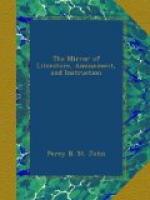ADVANTAGES OF A GOOD HEART,
A Fragment from the “Disowned,” by the author of “Pelham."
“The next day, Sir Christopher Findlater called on Clarence. ’Let us lounge into the park,’ said he. ‘With pleasure,’ replied Clarence; and into the park they lounged. By the way they met a crowd, who were hurrying a man to prison. The good-hearted Sir Christopher stopped—’Who is that poor fellow?’ said he. ’It is the celebrated’—(in England all criminals are celebrated. Thurtell was a hero, Thistlewood a patriot, and Fauntleroy was discovered to be exactly like Bonaparte)—’it is the celebrated robber, John Jefferies, who broke into Mrs. Wilson’s house, and cut the throats of herself and her husband, wounded the maid-servant, and split the child’s skull with the poker.’ * * * ‘John Jefferies!’ exclaimed the baronet, ’let us come away.’ ‘Linden,’ continued Sir Christopher, ’that fellow was my servant once. He robbed me to some considerable extent. I caught him. He appealed to my heart, and you know, my dear fellow, that was irresistible, so I let him off. Who could have thought he would have turned out so?’ And the baronet proceeded to eulogize his own good nature, by which it is just necessary to remark, that one miscreant had been saved for a few years from transportation in order to rob and murder ad libitum, and having fulfilled the office of a common pest, to suffer on the gallows at last. What a fine thing it is to have a good heart! Both our gentlemen now sunk into a reverie, from which they were awakened, at the entrance of the park, by a young man in rags, who, with a piteous tone, supplicated charity. Clarence, who to his honour be it spoken, spent an allotted and considerable part of his income in judicious and laborious benevolence, had read a little of political morals, then beginning to be understood, and walked on. The good-hearted baronet put his hand in his pocket, and gave the beggar half-a-guinea, by which a young, strong man, who had only just commenced the trade, was confirmed in his imposition for the rest of his life; and instead of the useful support, became the pernicious incumbrance of society. Sir Christopher had now recovered his spirits. ‘What’s like a good action?’ said he to Clarence, with a swelling breast. The park was crowded to excess; our loungers were joined by Lord St. George. His lordship was a staunch Tory. He could not endure Wilkes, liberty, or general education. He launched out against the enlightenment of domestics. ‘What has made you so bitter?’ said Sir Christopher. ‘My valet!’ cried Lord St. George; ’he has invented a new toasting-fork; is going to take out a patent, make his fortune, and leave me; that’s what I call ingratitude, Sir Christopher; for I ordered his wages to be raised five pounds but last year.’ ’It was very ungrateful,’ said the ironical Clarence. ‘Very!’ reiterated the good-hearted Sir Christopher.




